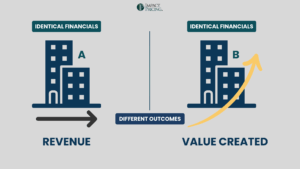To start with, I strongly believe finance should NOT set prices.
Now don’t get me wrong – finance cares a great deal about pricing, because part of their job is to monitor profitability. They need to determine how profitable the company will be, and pricing is a major part of this. They care about pricing, but they should not SET prices.
Here’s the problem: those in finance don’t know the real value of their products. If they set prices, the only strategy they use is cost-plus pricing. Anybody who knows anything about pricing knows this is the wrong answer if the goal is to maximize profit.
This isn’t to say finance teams can’t play an important role in pricing. There are many ways, including:
Margin guidance: Finance knows what investors/owners expect in terms of overall margin. They can give guidance to those in charge of pricing, who then can ensure the blended margin, across all of their products, achieves the margin goal.
Margin floor: Some companies set a margin floor, meaning they won’t accept any business at a margin below that level. I’m not a huge fan of margin floors, because sometimes companies can accept business at a loss in order to gain other business at a profit. However, one of the roles of finance is to mitigate risk for the company; margin floors help significantly in this capacity.
Price monitoring: Now is where those in finance and pricing can and should work closely together. Finance constantly collects and analyzes data about the business. The two groups should think about what information around pricing will help them understand the health of the business. For example, monitoring average discounts by product could indicate that market conditions have changed. The win/loss ratio is another indicator of changes in the market. There are many other KPIs or measurements that can be monitored by those in pricing and finance.
Pricing committee participation: some companies have a dedicated pricing committee where representatives from different parts of the company come together to discuss and improve pricing practices. Finance should absolutely be one of those participants. As price methodology changes are suggested, finance plays a critical role in projecting the financial impacts of those changes on the business.
Price leadership: In a rare but powerful role, finance can take the lead on pricing. In this role, finance directs and monitors all pricing activities within the company. They spearhead the finding and fixing of all the profit leaks, including the product lines, sales, and even accounting. This is an ideal role for finance for several reasons:
- Pricing success is vital to the success of the company.
- Nobody else in the company generally takes on this role.
- Finance often has enough power to strongly influence all departments, and all levels.
- Finance already works closely with every department in the company.
An engaged and informed finance department can allow a company to have far more successful pricing. It’s just that finance should NOT set prices. They know numbers, they just don’t know value.















